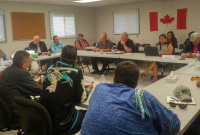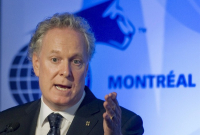Support strong Canadian climate journalism for 2025
France's ambassador to Canada found himself fending off questions about the dangers of Donald Trump Tuesday as he was cornered by a trio of Ottawa reporters who pressed him to weigh into the U.S. presidential election.
Climate change and energy issues haven't been dominant in U.S. media coverage of the presidential election, but Trump, the Republican nominee, has occasionally been criticized for making bizarre and unsubstantiated claims. In one instance, he said that global warming was a hoax invented by the Chinese to drive American manufacturers out of business.
While the French envoy avoided any direct comments about his preferred candidate, Ambassador Nicolas Chapuis, admitted a lot was at stake as the Paris climate change agreement comes into force.
But speaking at a conference organized by the Winnipeg-based International Institute for Sustainable Development, Chapuis said he had faith in the American people.
"Let's not pray for the worst, and let's remain optimistic," Chapuis said. "A year ago, on this date, many people thought that the U.S. would never go on board with an ambitious agreement in Paris. A year later, not only have they agreed with the deal, they have ratified it with an executive order of the president. So, what the leadership that the Obama presidency has shown, this is an asset for the world and I'm not going to speculate what will happen next January. But I would think that the American people are proud of what has happened over the past year."
I think everybody is concerned, says French ambassador
Chapuis made the impromptu comments after a panel discussion that included Katie Sullivan, a director from International Emissions Trading Association, along with Jennifer Allan from IISD and Robert Hofstede from International Development Research Centre. The panel touted progress from governments and markets in addressing climate change and addressed work that is still left to be done. But the ambassador said that he hoped any voices of skepticism about taking action to address global warming would disappear after the Nov. 8 election.
"I think everybody is concerned about any movement that could impede what the Paris agreement did," he said.
Silent protest against Kinder Morgan pipeline
Environment Minister Catherine McKenna opened the discussion with a speech that stressed Canada must show more leadership in the lead up to an upcoming global climate change summit that starts next week.
"To solve climate change we need to work together," McKenna said. "We all know we need to do better. But of course there's a big difference between words and actions, between knowing where you need to go and getting there. And that's why our government is laying the groundwork to grow a clean economy that creates good middle class jobs for Canadians. That's why we're working so hard with all the provinces and territories, Indigenous leaders, business, environmentalists, youth and the Canadian people. Because we know we need to reduce carbon pollution and we know we need to drive innovation in our economy."
But in a very Canadian-style protest, four millennials — Daniel Cayley-Daoust, Kate Perfitt, Megan Bowers and Gabriel D'Astous — silently stood up to hold signs calling on the federal government to reject a proposal by Texas-based Kinder Morgan to expand a pipeline network linking Alberta's heavy oil producers to Vancouver harbour. The protesters are part of an organized plan to challenge the Liberal government's climate policies and press it to accelerate Canada's shift away from fossil fuels toward more renewable forms of energy.
"This is good, I support open discussion," McKenna said as she noticed them standing up with their signs.

The four protesters wound up sticking around until the end, nodding occasionally to show agreement with some of what McKenna was saying. When she was done, all four left without saying a word.
Stopping the death of the planet
Chapuis, the French ambassador, later said that mass mobilization around the world has forced politicians to take action on climate change. But he also had concerns that populist rhetoric could threaten that progress.
"For people who are doubtful about climate change, please read, go watch, it is right in front of the eyes," he said. "The distrust in elites, the anger at globalization, the concerns of everyone's life conditions, jobs ... all this could impair the resolution of global issues. Yet, because of the impact of climate change, that everybody sees everywhere, people I think cannot ignore what is happening."
Ultimately, he said that he was optimistic that the people will push their governments to do the right thing on climate change, adding that it was also important to help the public understand what types of individual actions they can take to do their fair share.
"There is no bigger danger facing anyone than the death of the planet," said Chapuis. "And I think that's rather easy for any family to understand and when the Canadian government or the French government says that the main legacy of good governance is to transmit a clean world to one's children, I think that's easy to understand whatever the other populist cultures might be."






Comments